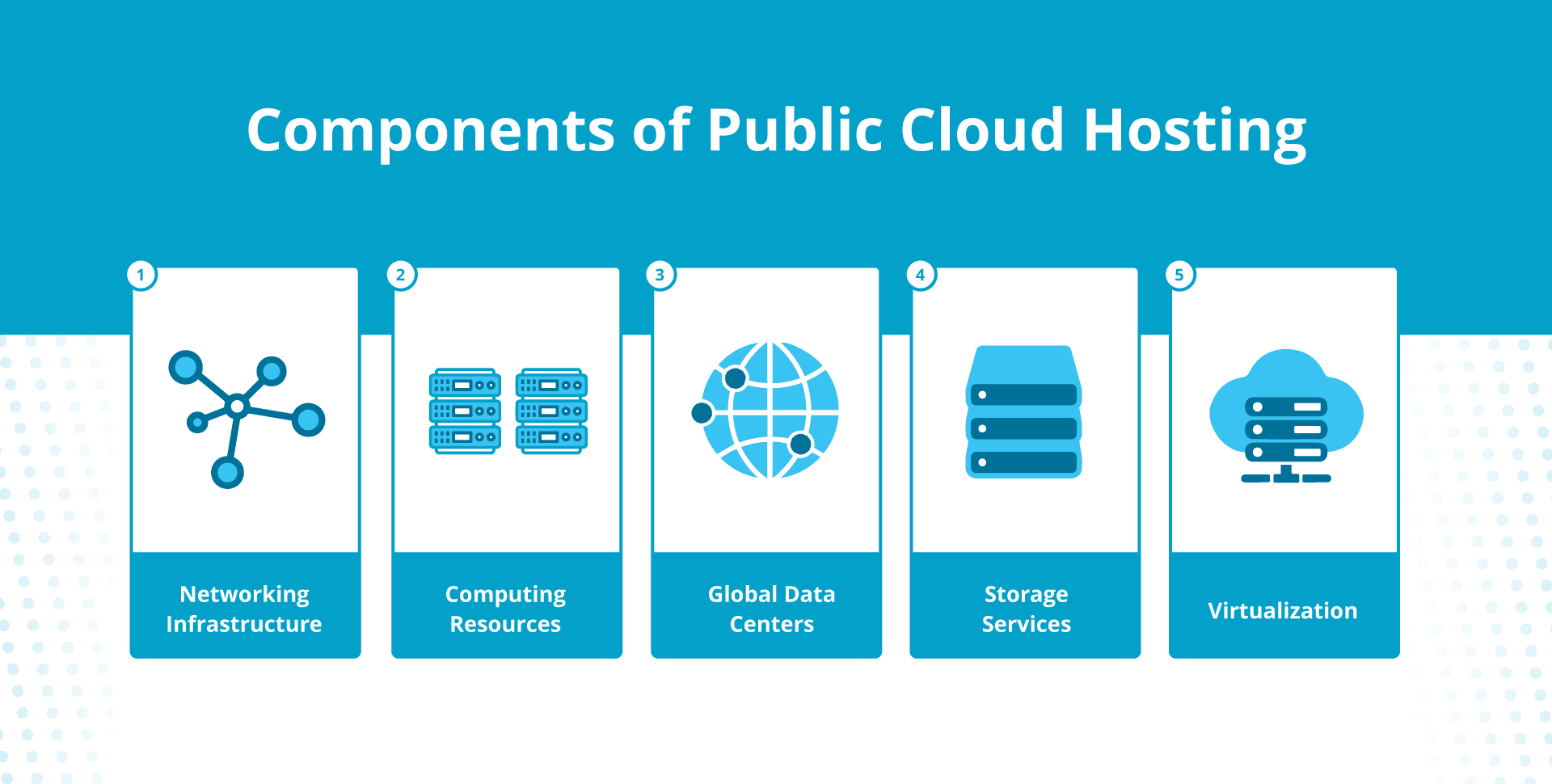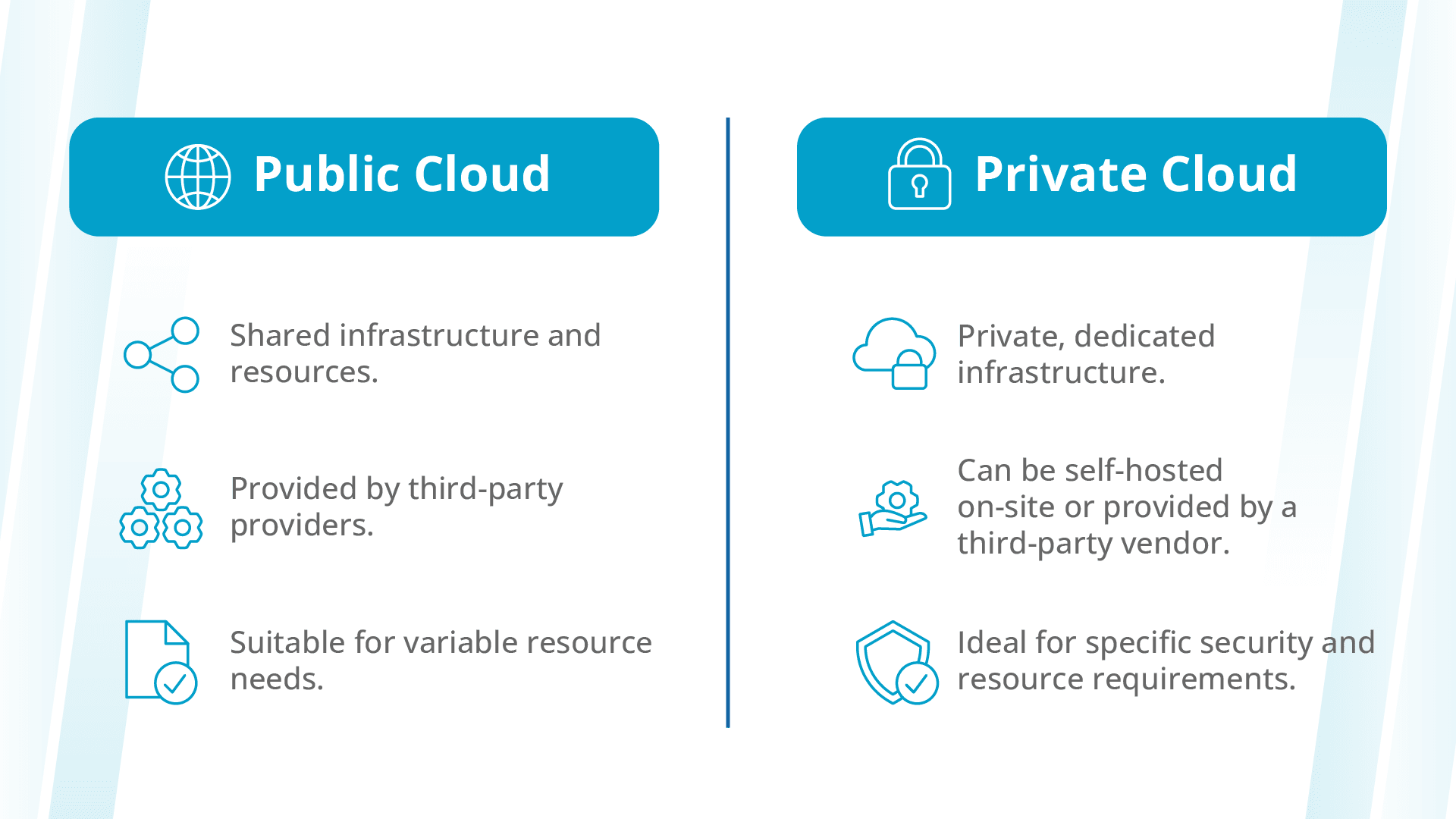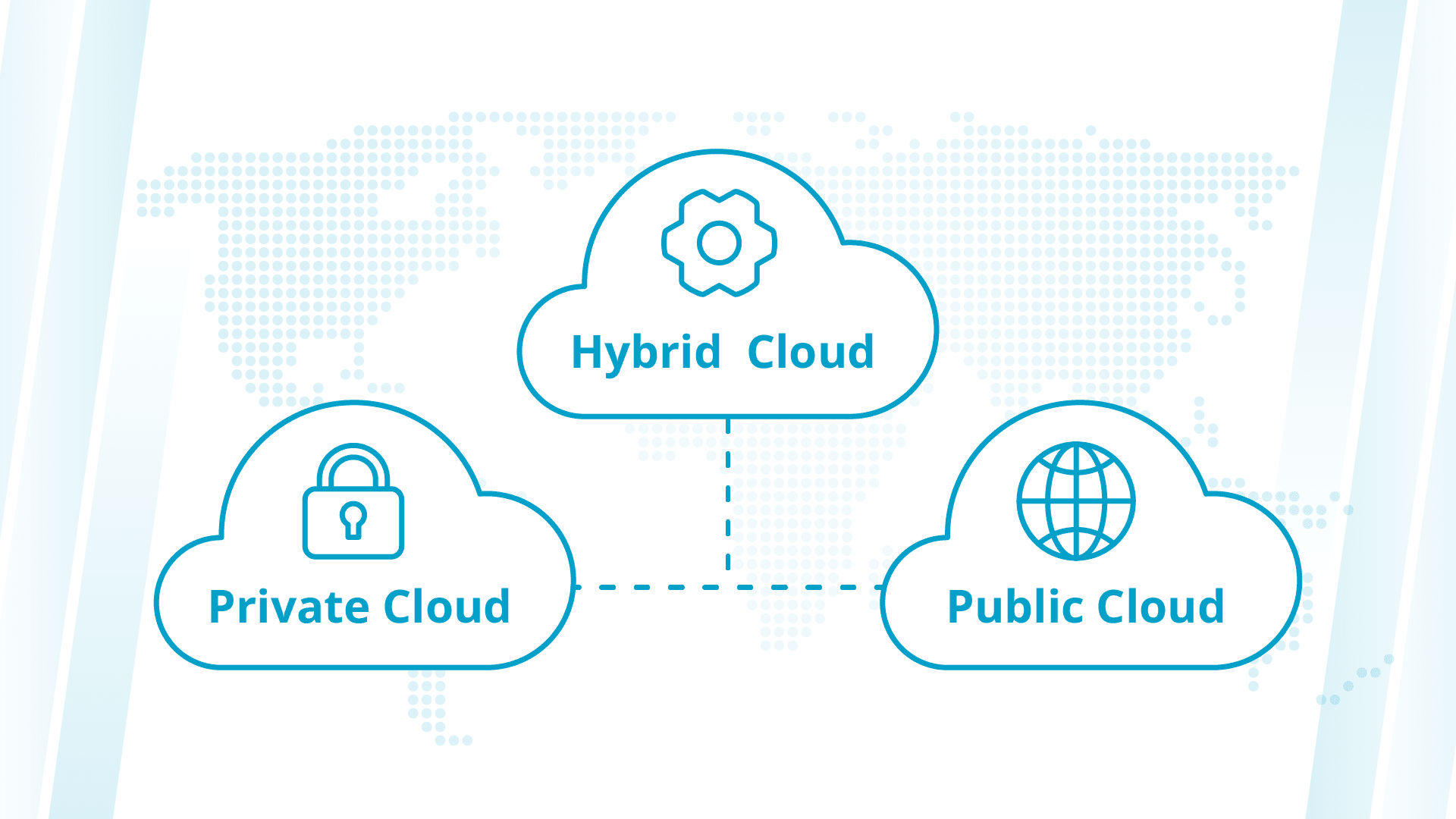Why use public cloud hosting for your business
Key points
- Public cloud hosting is a kind of hosting service where computing resources are shared among multiple users.
- Alternatively, the private cloud’s infrastructure is dedicated exclusively to a single organization.
- Businesses that would benefit from using public cloud hosting include startups, ecommerce businesses, media and entertainment companies, and enterprise companies.
- Using public cloud hosting comes with several benefits, such as cost efficiency, scalability, reliability, and flexibility.
- Public cloud hosting also has its disadvantages like security and compliance concerns and control limitations.
- Factors to consider when choosing a public cloud hosting provider include service features, performance, cost structure, security and compliance, support, and scalability.
For businesses that wish to adapt quickly to the changing needs and demands of the modern business landscape, owning and managing an in-house IT infrastructure can feel burdensome. Besides making upfront investments to push business initiatives, you need to continually hire, train, and manage IT staff to maintain and troubleshoot your data centers.
If you’ve been having similar struggles, the idea of moving to the public cloud might have crossed your mind. And why not? According to a recent Statista study, the global market for public cloud services is expected to grow by 20.4% in 2024.
But what if moving to the cloud compromises your data? Will it supersede your legacy systems? How about compliance?
Liquid Web can answer all your questions about public cloud hosting, including how it can help your business and some of its disadvantages. We’ll also discuss what to look for when choosing a public cloud hosting provider.
What is public cloud hosting?

Public cloud hosting is a kind of hosting service where computing resources — including storage, bandwidth, and networking — are shared on demand among multiple users over the public internet.
As the term suggests, the computing resources are stored within the cloud, a network of connected physical servers worldwide. And since virtualization technology is at the core of cloud computing, being on the public cloud allows you to scale when you need more cloud resources.
Unlike traditional on-premise infrastructure, public cloud hosting doesn’t require you to produce, manage, or maintain your data centers. Instead, you offload the burden to third-party CSPs (cloud service providers) so they can do all of that for you.
Popular examples of public cloud hosting providers include Google Cloud, Microsoft Azure, and AWS.
Public cloud vs private cloud

While the public cloud’s infrastructure and resources are shared among multiple users over the public internet, the private cloud’s infrastructure is dedicated exclusively to a single organization.
It doesn’t matter if the infrastructure is self-hosted in an organization’s own data centers or owned and hosted by a third-party provider. If it provides dedicated resources to a single tenant, it’s a private cloud.
The better choice depends on your organization’s specific needs and requirements. If you want greater organizational control and security, you may be better off using a private cloud. If your priority is cost-effective scalability and you don’t mind some trade-offs in control, public cloud is a stronger choice. In most cases, it’s better to strike the right balance between the two, which brings us to our next section.
Hybrid cloud hosting

Hybrid cloud hosting is a cloud computing model that combines the elements of public and private cloud hosting, creating an integrated computing environment that serves an organization’s unique needs and requirements.
Each business is different, but in many cases, a business will be better off using a combination of public and private cloud. For example, you can keep critical legacy systems in your data centers while migrating non-sensitive workloads to the public cloud.
In fact, 87% of cloud users and IT decision-makers are using a hybrid cloud hosting strategy.
Who should use public cloud hosting?
Let’s explore the types of companies that would benefit from public cloud hosting the most.
- Startups: Startups have limited budgets but need operational agility and iterative processes to kickstart their business. By making data and applications cloud-based, they can lower their time to market since resources and applications are readily available.
- Ecommerce businesses: To prepare for traffic spikes, ecommerce businesses can take advantage of public cloud hosting’s unlimited scalability.
- Media and entertainment companies: The public cloud can provide these organizations with network resources at scale and on demand, ensuring that users can watch or enjoy their media with little interruptions or latency.
- Enterprise companies: Enterprise companies can take advantage of the public cloud’s scalable solutions and efficient resource allocation with virtual machines to maintain their market share, implement business continuity, and keep up with the market's ever-shifting demands.
The benefits of public cloud hosting
Businesses that invest in public cloud hosting can enjoy the following benefits:
Cost-efficient
With public cloud hosting, you don’t need to dip into your capital to purchase equipment or software.
You also don’t need to worry about continuous expenses in maintaining an in-house IT staff. The cloud service provider will assume responsibility for maintenance, updates, and security patches.
And because you only pay for the resources you use, you don’t need to worry about overpaying for computing services.
Last but not least, you don’t bear the full financial burden of procuring and maintaining a cloud infrastructure since you share those costs among multiple tenants.
Scalable
With public cloud hosting, resources are distributed among tenants based on what each individual client needs at any given time.
So, if one individual client or business experiences a sudden surge in traffic, resources can be shifted to meet that demand.
Reliable
Downtime can hurt your business. In fact, the average cost of downtime per hour exceeds $300,000 for 91% of enterprises.
While no hosting service is completely immune to downtime, public cloud hosting providers typically offer more reliable uptime than private systems. After all, cloud infrastructures rely on a vast network of physical servers distributed across multiple locations. If one cloud server encounters an issue, you can count on other servers to pick up the slack. That redundancy allows leading CSPs to offer a “five-nines availability” (99.999% uptime) service level guarantee.
What's more, public cloud services use load balancers to ensure that resources are evenly distributed across multiple servers. This minimizes downtimes and improves the network’s performance, even during peak hours.

Flexible
Having all your data stored in your on-premise data centers can offer some measure of comfort. However, it comes at the cost of flexibility.
To adapt to the changing demands of the marketplace and seize business opportunities instantly, you can harness the public cloud’s automated provisioning functionality to scale up or down based on your current needs. For example, a SaaS company can scale up and down to match high-demand periods seasonally.
Thanks to this added flexibility, you can supercharge your innovation, iterate faster, and get the most out of your investments.
Disadvantages of public cloud hosting
For all its benefits, public cloud hosting does have some disadvantages.
Security issues
Major cloud providers, in particular, implement robust cybersecurity measures to protect your data. That said, since public clouds are on the public internet, there’s always the risk of unauthorized access, data breaches, and social engineering attacks.
According to the 2022 IBM Cost of a Data Breach Report, data breaches in the public cloud are the costliest among all cloud models. The same report also shows that data breaches in public clouds have long lifecycles.
Compliance concerns
Compliance is critical to business success. It keeps your business out of legal trouble and encourages users to trust you with their data (and money).
These concerns can cause some businesses to hesitate to move to the cloud. A 2022 report by MarketsandMarkets says that the global cloud compliance market is expected to grow from $30 billion in 2022 to $59.1 billion by 2027.
While most public cloud providers provide robust security measures and offer compliance certifications, industries with strict regulatory requirements that deal with sensitive data, such as health and finance, still hesitate to entrust their data to the public cloud.
Limited control
With public clouds, the cloud provider owns and manages the entire infrastructure and its resources.
That means you have limited control over how data is stored and managed. The best way to deal with this limited control is to carefully select a high-quality cloud hosting provider.
7 factors to consider when choosing a public cloud hosting provider
Consider the following factors to ensure your migration to the cloud goes smoothly and pays dividends for your organization.
1. Cloud service features
Pick a CSP with offerings that will serve your business
While each cloud provider is different, many will offer the following features:
- Storage: As your business grows, so does the amount of data it collects. Pick a provider that offers a cloud storage system that’s durable, secure, and reliable.
- Databases: Make sure the cloud provider offers databases that help you deploy your data in ways that align with your business’s needs and scalability goals.
- Machine learning: A cloud provider with robust machine learning capabilities can help you make sense of your vast data sets and leverage them in ways that optimize your business processes.
2. Performance
Pick a public cloud provider that has a history of strong performance. You can examine each provider’s network uptime (Liquid Web, for instance, offers a nearly 100% network uptime guarantee) to see if they have lived up to their promises.
You can also examine each provider’s track record by looking for online reviews, testimonials, and case studies.
3. Cost structure
Closely examine each provider’s pricing model and structure. Do the service levels justify the cost? Do they offer extras to justify extra costs?
Be sure to check for additional resource costs when scaling up and any data limits as well.
4. Security and compliance
Public clouds are more vulnerable to cyber attacks than private clouds, but many providers have robust cloud security in place to help combat bad actors.
When evaluating each public cloud hosting provider, start by examining their security measures and encryption protocols. Are access controls in place? Do they have a PCI compliance certificate? Do they consistently run risk assessment checks?
5. Support and SLAs
Staying on top of the IT infrastructure behind the public cloud can get complex quickly, and you need all the help you can get.
As such, pick a cloud service provider with a great reputation for customer support. Make sure the company’s support team is available 24/7/365 and has multiple support channels and quick response times.

6. Scalability
When choosing a CSP, pick the one that offers auto-scaling features. After all, your organization’s ability to increase or decrease IT resources based on real-time needs will be pivotal in helping your organization keep up with the changing demands of your industry.
However, don’t select a provider just because it has cloud scalability. Take the time to check if the cloud network has an upper limit. If it does, check if that limit is within your expected seasonal peaks.
Final thoughts: Why public cloud hosting can transform your business
Public cloud hosting has a ton of benefits that can help your business grow and succeed without breaking the bank.
However, you should assess your needs and long-term goals to see if public cloud hosting is ideal for you. For many businesses, public cloud-based services help you compete with larger companies at a fraction of the cost of maintaining your own infrastructure.
As you weigh your options, consider the advantages of high performance, scalability, and security to using Liquid Web's public cloud. And if you decide you need a private cloud solution, our VMware private cloud may be right for you.
Related Resources
Keep up to date with the latest Hosting news.



